18th Century Gentleman’s Magazines – So Much For So Little…
July 16, 2021 by GuyHeilenman · Leave a Comment
Over 40 years ago we discovered one of the best titles of the 18th century for period news reporting. The title wasn’t even a newspaper but rather, “The Gentleman’s Magazine” from London.
Having begun in 1731, Gentleman’s Magazines ran uninterrupted for nearly 200 years publishing pages capturing news reports concerning America which could never be found in period American newspapers, and were rarely found in period British newspapers.
 From its earliest years this popular title printed reports as varied as the creation of the colony of Georgia, William Penn laying out the city of Philadelphia, slave revolts, and reports of pirates operating in the Caribbean.
From its earliest years this popular title printed reports as varied as the creation of the colony of Georgia, William Penn laying out the city of Philadelphia, slave revolts, and reports of pirates operating in the Caribbean.
Issues have much on Ben Franklin & his work with electricity including the lightening rod & famous kite experiments as well as rarely published poems by the famed slave poet Phyllis Wheatley.
Death reports of the famous–and infamous–abound, from Mozart to Handel, from John Paul Jones to George Washington, Patrick Henry and Benedict Arnold… the list is awe inspiring.
Military events are abundant including much on the French & Indian War (with very early Colonel George Washington reports) & all the Revolutionary War battles from the Boston Massacre through the Treaty of Peace.
Keep in mind the American colonies were part of the global British Empire until 1776 so there was much interest in not only American events but notable world events which affected the broad scope of British interests.
Some of the best gems to be found are very inconspicuous reports such as the hanging of what would famously become known as the Liberty Bell. Under the heading: “America” and with a “Philadelphia, May 10” dateline from 1753 is a report reading: “Last week was raised and fixed, in the State-House Steeple, the great bell, weighing 2080 lb. cast here, with this inscription, ‘Proclaim liberty throughout all the land, to the inhabitants thereof.”
The full text of the hated Stamp Act is found within the pages of a Gentleman’s Magazine, and just one year later is found the formal repeal of the Stamp Act by King George III. Other Acts of Parliament harmful to colonial relations are reported as well.
Historic documents are certainly not lacking, among them being the Articles of Confederation, the “Causes & Necessity for Taking Up Arms”, the Constitution of the United States (in 1787), and the most desired document of all, the Declaration of Independence.
At a time when an early period printing of the Declaration in an American newspaper will sell for a half a million dollars or more, the ability to purchase a 1776 magazine with a timely printing of the full text of the document for under $4000 is a rare opportunity for any collector.
An added bonus found in many issues of Gentleman’s Magazine is that while plates and maps can simply not be found in newspapers of the 18th century, this wonderful publication contains a wealth of these engravings and wood-cut prints.
Printed separately from the regular pages of the issue and tipped within, most of the maps fold out to be double the size of the issue, and they include some of the more desired maps one would want of the 18th century, including Philadelphia, the colonies (from 1755), Pennsylvania, Connecticut, Rhode Island, the Caribbean, St. Augustine, the entire western hemisphere and so much more. Many collectors choose to frame the maps separately from the issue as they are very decorative and are typically dated in an upper corner.
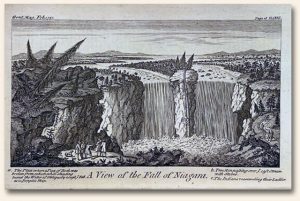 Plates include the Philadelphia State House (later to be known as Independence Hall), St. Philip’s Church in Charleston, the fort at Bunker’s Hill, Ben Franklin’s ‘Square of Squares’, the guillotine which beheaded Louis XVI and his wife, a slavery medal, and even a plate of the Garden of Eden. What I have just described only scratches the surface of the treasures these magazines hold.
Plates include the Philadelphia State House (later to be known as Independence Hall), St. Philip’s Church in Charleston, the fort at Bunker’s Hill, Ben Franklin’s ‘Square of Squares’, the guillotine which beheaded Louis XVI and his wife, a slavery medal, and even a plate of the Garden of Eden. What I have just described only scratches the surface of the treasures these magazines hold.
The “Gentleman’s Magazine” is a little gem packed with all the history one would want to find from the 18th century. Each issue typically has about 40 pages, and measuring about 5 by 8 inches, they take up very little room in a collection.
Perhaps best of all, The Gentleman’s Magazine is an accessible title as our inventory contains thousands of issues, and at prices far below what would be found in comparable American & British newspapers of the same period.
There can be little excuse for holding back on buying the best events in American history if one is willing to add this famous & successful title to their collection. And there certainly will be a time when even this title will become quite scarce as others discover it as a treasure just begging to be collected.
The Gentleman’s Magazine & Bankruptcy…
May 8, 2021 by Stephanie Williams · Leave a Comment
Under the illustration of St. John’s Gate that introduces each issue of the Gentleman’s Magazine, is the month and year, followed by the table of contents (each issue via the link will show an image of this – typically the last image posted). For the first time, I noticed the calligraphy that follows “CONTAINING” and precedes the article headings and their corresponding page numbers. “More in Quantity and greater Variety than any Book of the Kind and Price.” While I have nothing to compare it to, I can attest that of the thirty-seven distinct articles listed for March of 1782, the subject matter ranges from Parliamentary debates to a Swiss underground road, and includes bull-baiting and the wool trade along the way. The regular coverage of weather, news from around the world, births and marriages and deaths, trials, and literary reviews is fit in around the special bits.
In particular, my interest was caught by “Usual Causes of Bankruptcy, Caution against — ” and turned to page 138 to read.
In all ages there have been men, who, by sudden losses, by entering into indiscreet obligations, by improvident conduct, or through fraudulent designs, have become, or pretended to become, incompetent to the discharges of their just debts; but the number of bankrupts which now appear in every Gazette is a subject of serious and alarming consideration.
Along with the obvious financial harm that can be caused by frivolous living and participation in gambling, the author addresses the lack of care and foresight that must be viewed as the social responsibility of every gentleman, in order to enable him to properly discharge his debts and contribute to the public funds by means of taxes. He recommends annual reflection for the purpose of seeing areas of weakness in funding, and to not allow debts to unknowingly pile up beyond the ability to repay. Then, he maintains, steps toward frugality can be made in enough time to avert distress. Finally, he offers as example the late Sir Stephen Theodore Janssen who he terms a “virtuous citizen.” He records the words of Sir Stephen, addressed to the Livery, as he deems them of value to the general population. The speech concludes in this way:
I do further declare that it is my determined resolution to continue living in the same frugal manner, till the last shilling is discharged; and in case any turn of fortune should happen to me, my whole just debts shall be discharged so much the sooner, as I am determined to persevere in preserving the character of an honest man.
The Gentleman’s Magazine & Poetry… Still learning…
September 28, 2020 by Stephanie Williams · Leave a Comment
Nestled among the prosaic commodity prices, legal decisions, and historical chronicles that regularly appear in an issue of Gentleman’s Magazine is a section that seems surprising to me — “Select Poetry, ancient and modern.” In some ways, this is a reminder that times certainly have changed, and things are not as they always were. A current publication for the leaders of our era, such as Forbes or Bloomberg or The Wall Street Journal would not contain poetry, unless a noteworthy personage deviated from business acquisition long enough to write, or possibly promote a struggling artist in the name of philanthropy, etc.
But, once upon a time, the well-educated person was learned in literary as well as economic matters. As the 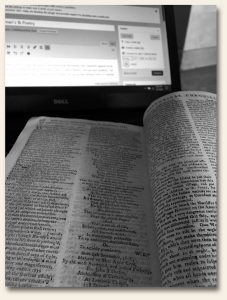 column title hints, the classical emphasis on education set a background that persisted into all arenas of life. With this in mind, I delved into the section and became even further struck by the subject matter of my sampling in meter and rhyme. The closing refrain to each stanza concludes that nothing in life matters without….love.
column title hints, the classical emphasis on education set a background that persisted into all arenas of life. With this in mind, I delved into the section and became even further struck by the subject matter of my sampling in meter and rhyme. The closing refrain to each stanza concludes that nothing in life matters without….love.
But weak is our vaunt
While something we want,
More sweet than the pleasure that Prospects can give.
Come, smile, damsels of Cardigan,
Love can alone make it blissful to live.
The author of this particular poem only provided his (presumably) initials to this listing of Prospects, Nectar, Odours, Music, Friendship, Learning, Riches and Honour. All, the poet asserts, are not sufficient to bring bliss to life — only love can do that. The musings that follow include “Ode to a Goldfinch”, “An Astronomical Thought” and “A Translation of the Epitaph”. Put together, they summarize the principle concerns of the time period — the natural and known world, the world yet to be discovered, happiness within all experiences, and the context provided by knowledge of eventual death.
That is, indeed, a selection of ancient and modern — even the modern of today.
Gentleman’s Magazine & Insanity…
August 10, 2020 by Stephanie Williams · Leave a Comment
Living in a time of health concerns brought on by a previously unknown viral threat brings me a heightened awareness of the historical mysteries recorded in these ledgers from the past. Advertisements give a clue to the extensive maladies that troubled mankind hundreds of years ago, many of which remain challenges even today. Liver ailments, gout, yellowed eyes, rashes, sleeplessness, and obesity are just a few things for which patented tonics and trusted treatments abound. Based on a sampling of papers such as Leslie’s Illustrated, Harper’s Weekly and any of the Wild West titles in 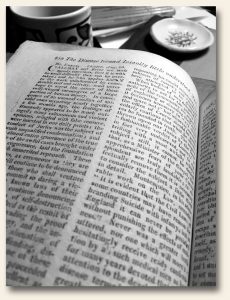 the vast Rare & Early Newspapers collection, there is no doubt left that disease is a plague of the human condition.
the vast Rare & Early Newspapers collection, there is no doubt left that disease is a plague of the human condition.
Nothing, however, seems to baffle and burden society as a whole, and physicians in particular, as diseases of the mind. And The Gentleman’s Magazine that I pulled out from October of 1808 describes the tension brought about by the ignorance in a field so relevant to our existence.
In particular, the writer addresses Mr. Urban on the unfairness of the societal and ecclesiastical condemnation of suicide, without considering the mitigating circumstances of mental illness.
In consequence of an unusual conflux of suicidal cases occurring nearly together a few months ago, the feelings of Humanity appeared to be much outraged; many calumnious and violent opinions, mingled with false censure, were inserted in our daily prints; the conduct of Juries was the subject of much unqualified condemnation; and al almost entire ignorance of the true state of the awful cases brought under their cognizance, laid the foundation of much unmerited reproach.
His pointed statement halfway through the piece provides an explanation for suicide with the following question and answer: “Why does it appear that Suicide is more general than formerly? The answer is at hand: Insanity is an increasing disease. A few of the bulky catalogue of human ailments have evidently decreased; unfortunately, this is not of the number.”
There’s so much more in this article that speaks to the same subject today. While I don’t know concerning the correlation between the two, I do applaud the perspective towards those who suffer in this way. It was a lofty goal then and is, in my humble opinion, still.
It is an absolutely demonstrable fact, that in nine cases out of twelve of self-destruction which our daily papers record, the previous situation of the subject is known, and the fatal crisis might be prevented were this knowledge acted upon with firmness, promptitude, and that just method which honour, humanity, and justice demand.
Still Learning… Gentleman’s Magazine – “Obituary, with Anecdotes”…
June 15, 2020 by Stephanie Williams · Leave a Comment
Bound volumes are masterful displays of a subscriber’s esteem for the published word. Not only aesthetically pleasing, they are effective methods of preserving printed pages from more than 200 years ago. I am quite partial to the untrimmed collections with ruffled edges wrapped into a stack and placed between two decorative covers. As most collectors are not seeking entire volume, individual dates are disbound before being sent out. Each extraction leaves a gap, and, consequently, all sorts of misshapen profiles neatly array our shelves.
Today I pulled an untouched volume of The Gentleman’s Magazine that chronicled an entire year, and spent some time just scanning the page headings. And stopped, quite decidedly, when I read, “Obituary, with Anecdotes, of Remarkable Persons”. Like a w ander through an old cemetery, there is something appealing about reviewing the names of these people of note, as well as the few words allotted to them at the close of their lives. Who made the cut, and was worth a mention? What chosen phrase summarized the extraordinary essence of a human being and his or her impact on the world around them for the span of their days? Some epitaphs perfectly illustrate “damned with faint praise” and others kindle a more noble flame within those who have time to amend their mark. Either way, the vocabulary and turn of the phrase most definitely eclipse my tone and word choice, so I will let those loftier pens speak for themselves.
ander through an old cemetery, there is something appealing about reviewing the names of these people of note, as well as the few words allotted to them at the close of their lives. Who made the cut, and was worth a mention? What chosen phrase summarized the extraordinary essence of a human being and his or her impact on the world around them for the span of their days? Some epitaphs perfectly illustrate “damned with faint praise” and others kindle a more noble flame within those who have time to amend their mark. Either way, the vocabulary and turn of the phrase most definitely eclipse my tone and word choice, so I will let those loftier pens speak for themselves.
In Gloucester-place, Mary-la-Bonne, in her 32d year, Helen, wife of H.T. Hardacre, esq. the original proprietor of “The British Neptune,” leaving a young and numerous family.
At her brother-in-law’s house, in Russell-square, aged 50, Mrs. Elizabeth Trelawny, wife of Capt. T. Adjutant of the Bedforeshire Regiment of Militia. She was esteemed in the earlier part of her life as particularly handsome; and Time had been uncommonly kind in making his progress on her countenance with forbearance.
In his 47th year, having enjoyed his title only two years and a half, Peter-Isaac Thellusson, Baron Rendlesham, of Rendlesham. He was on a shooting party at Gosfield with Louis XVIII, the Earl of Chatham, and other Nobles, when he suddenly fell from his horse, and expired.
I couldn’t help smile at the section that immediately preceded this: “Additions and Corrections to former Obituaries,” but that’s an excursion for another day.
Mid-18th century math challenges found in Gentleman’s Magazines…
July 27, 2017 by GuyHeilenman · Leave a Comment
Two weeks ago, as we were exploring the varied content to be found in 18th and 19th century Gentleman’s Magazines, we took time to focus on the monthly mathematical challenges the publisher would serve up to the subscribers. At the time we provided our readers with a set of challenges from an issue dated May, 1768. Admitting they were a bit difficult, the following week, along with the available solutions which appeared in the August issue, we provided yet another set of mathematical exercises. The results to this 2nd set are shown below. Whether it is content covering the (now) historical events of the day, book reviews, obituaries, poetry, maps, plates (diagrams), and yes, even mathematical challenges, 18th and 19th century Gentleman’s Magazines never fail to deliver on a truly contemporary experience. As we’ve often said (slightly revised): “History (and poetry, and book reviews, and discoveries, and ____) are never more fascinating than when read from the day they were first reported.”
Solutions to the May, 1768 Gentleman’s Magazine’s math exercises…
July 20, 2017 by GuyHeilenman · Leave a Comment
Last week we posted a set of math exercises which were provided in the May, 1768 issue of The Gentleman’s Magazine. Today we post the solutions (see below). Understanding that the set of problems were a bit cryptic to the 21st century mind, the bottom of the solutions below provides yet another set of problems to explore – which appear a bit more straight-forward. We’ll post the solutions to these next Thursday. Before you throw in the towel, don’t forget the famous words of W.E. Hickson: “If at first you don’t succeed…”
Are you smarter than a 18th century 5th grader? Math exercises within Gentleman’s Magazines…
July 13, 2017 by GuyHeilenman · 2 Comments
As we continue to explore the diversity of content found on the pages of 18th and 19th century Gentleman’s Magazines, our attention was drawn to the abundance of Mathematical challenges found within many issues – particularly those from the 1700’s. Rather than opining on the difficulty level of the quests as opposed to what might be expected of the average reader of a common (blog) post or publication of the 21st century, especially since we have no idea as to the intended target audience. Instead, let’s just enjoy the challenge as if we were living just prior to the American War for Independence.
The challenge: On a somewhat regular basis the publisher would provide a set of Mathematical exercises and invite their subscribers to submit solutions. These responses would then be printed (along with the names of those who submitted them) within a future magazine – typically 1-3 months later. The set shown below is from an issue dated May, 1768. Go ahead and give the problems a try. As an act of 21st century kindness, next Thursday I’ll post the solutions which were submitted in 1768. Are you bold? Go ahead and reply with your solutions prior to next Thursday and allow the collectible world to observe your mathematical genius – or at least your ability to rival the math-prowess of a 17th century 5th grader – or mathematics professor of the period. Enjoy.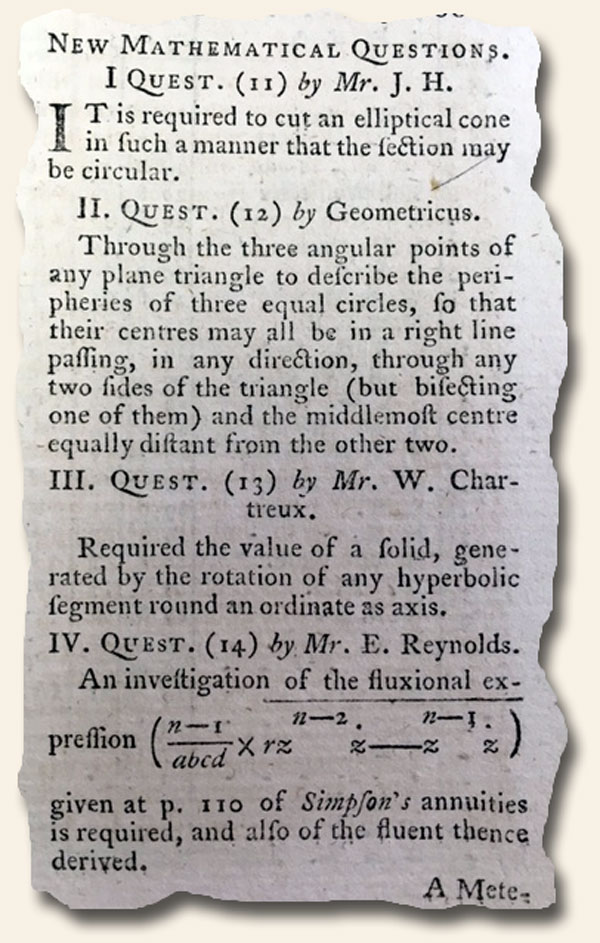
Victor Hugo – poetry in early 19th century Gentleman’s Magazines…
June 29, 2017 by GuyHeilenman · Leave a Comment
In our opinion, one of the early titles we come across, The Gentleman’s Magazine, is grossly underappreciated. This London “Reader’s Digest-sized” publication which spanned the early 18th through mid-19th centuries and was known for great reporting from throughout the world, was also pregnant with book reviews, poetry, mathematical challenges, birth and death notices, and an abundance of plates depicting everything from maps to sketches of rare animals, historical cathedrals, and notable men and women of the era. While we’ve written about this title in previous posts (view posts), our attention this time around is in regards to poetry – with a question.
Whereas nearly every issue contains poetry of the period, the poets are often unknown to me, and therefore, rarely catch my eye. However, during the process of scanning The Gentleman’s magazine for July, 1833 looking for content related to the Slavery Abolition Act of 1833, one name in the heading of a poem caught my eye: Victor Hugo. After reading the poem – and being moved, I became curious as to whether this was an early (1st???) printing – and therefore more valuable as a collectible, or if he had penned it many years prior. Unfortunately a cursory on-line investigation came up empty in regards to a validation that the poem was even written by him, let alone its original date of publication. Of course this begs the question: Can anyone attribute this to him and/or confirm its first printing? If anyone is in the know, please share your knowledge with the collectible community. Thanks in advance. AND as for the poem itself:
Edward Cave Junior, and his Gentleman’s Magazine…
March 24, 2014 by GuyHeilenman · Leave a Comment
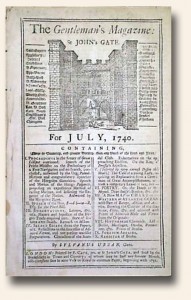 A few months ago we wrote about what is considered by many to be the most successful literary magazine of all time, The Gentleman’s Magazine. While RareNewspapers.com continues to offer many original issues of this title from the 18th and early 29th centuries, few know of the magazine’s or its founder, Edward Cave, Junior. A collector friend recently came across a wonderful posting by The Society of 18th-Century Gentleman which goes into considerable detail concerning both. An excerpt includes:
A few months ago we wrote about what is considered by many to be the most successful literary magazine of all time, The Gentleman’s Magazine. While RareNewspapers.com continues to offer many original issues of this title from the 18th and early 29th centuries, few know of the magazine’s or its founder, Edward Cave, Junior. A collector friend recently came across a wonderful posting by The Society of 18th-Century Gentleman which goes into considerable detail concerning both. An excerpt includes:
“…Edward Cave eventually purchased a small print house and shortly after began The Gentleman’s Magazine. The first issue appeared in January of 1731. Cave quickly became a highly respected publisher and businessman, and “a multitude of magazines arose” all over the world. The magazine was soon the most well-known and highly respected publication in the English language. It is widely believed that Mr. Cave was the first person ever to use the term “magazine” to describe a monthly publication of this type…”
If you’ve never perused this little gem, you’ll be pleasantly surprised with its detailed coverage of events of the day.


